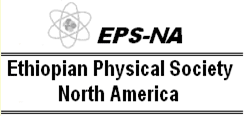The Birth of the North American Chapter of the Ethiopian Physics Society
Solomon Bililign*

Despite the glorious past, modern higher education started in Ethiopia very late. The first University was established after the Second World War. The First Department of Physics in Ethiopia came into existence in 1966 with a BSc program. The Department has graduated more than 1100 students with BSc degree and about 90 students with MSc degrees. Current enrollments: Average of 200 undergraduates, 70MS and 15 PhD. In the last ten years about twenty-two new Universities have been established. The major universities currently are Addis Ababa University, Arbaminch, Bahir Dar, Debub, Haramaya, Jimma, Makealle, and University of Gondar. They all have physics departments with large enrollments.
Until recently (1983), all Physics graduates had to attend graduate programs in the US, and Europe. Consequently there are now a large number (over 100) of successful physicists of Ethiopian origin in the academic, industrial and government sectors both in North America and Europe. There is still a large influx of physics graduate students in the graduate programs in Europe and the US. This group has the potential to build a bridge with physicists in Ethiopia and jointly play a major role in shaping the future of Physics in Ethiopia and abroad.
There has been a strong desire by Ethiopian Physicist in the US to get organized and play a role in empowering the Ethiopian Physics community and help make physics research and education relevant to the needs of the country. Ethiopian physicists have been meeting informally at the APS general meetings since 1980 to discuss this issue. The first serious discussion of a formal organization was held during the APS centennial conference in Atlanta in 1999 with participation of about fifteen physicists from across the USA. This is where the seeds of a formal Ethiopian physics society were planted. All major accomplishments attributed to the society since 1999 are due to the leadership and dedication of Dr. Abebe Kebede, of North Carolina A&T University. The major accomplishments include the establishment of a vibrant and well- known website, and several workshops such as the 2003 session on physics in Africa at the APS March Meeting, and most recently the 2007 space physics workshop in Addis Ababa Ethiopia. One of the major challenges the society faced during this long period is lack of well-defined governance and connection between the leadership and the broad Ethiopian physics community in North America and in Ethiopia. As the Ethiopian physics community started growing in number and quality the need for reforming the organization to increase participation became quite apparent.
In 2007, the leadership board of the Ethiopian Physical Society in Ethiopia met with Dr. Solomon Bililign (Professor of Physics at North Carolina A&T State University) in Addis Ababa Ethiopia. The board asked Bililign to reorganize and revitalize the Ethiopian Physicists Society in North America. During this period Bililign also arranged the meeting between Dr. Judy Franz and Dr. Bekele at APC that formally led to Ethiopia’s membership to IUPAP.
Following the meeting in Addis Ababa, an organizing committee led by Bililign was formed to draft by laws and organize a meeting to formally establish the EPS-NA. The one-year effort finally led to the organizational meeting and workshop on August 2, 2008. Dr Judith Franz, APS executive officer welcomed the workshop participants. About eighteen Ethiopian Physicists met for one day at ACP to formally approve the bylaws and conduct elections. Elections were also conducted on line for those who couldn’t make it to the meeting. Dr Tessema, Guebre X (Professor of Physics, and currently a program officer at the National Science Foundation) was elected president unanimously.
The goals of EPS-NA are
- To serve as a forum for networking of Ethiopian born physicists in the US with the local organization in Ethiopia and sister organizations worldwide.
- To serve as an advocacy group to advance and promote the interests of the Physics Community in Ethiopia.
- To work closely with EPS to promote their priorities strengthen the organization by inviting new members, and work closely with national and governmental institutions with vested power and interest to promote science and technology in the country.
- To design and develop manageable short term projects to promote physics research in Ethiopia.
- To develop credibility and visibility in the scientific community both in the US and worldwide through tangible and measurable contributions.
- To reach out to the Ethiopian physics community and increase its memberships by contacting students, postdocs and professionals in the US.
* Solomon Bililign is a professor of Physics and Director of the NOAA ISET Center at North Carolina Agricultural and technical State University and Chair of the EPS-NA Organizing Committee.
EPS-NA acknowledges the support provided by APS to cover travel cost for participants and the free use of ACP facilities.
Views and opinions expressed in articles are those of the authors and are not necessarily shared by the editor or the APS/FIP. We reserve the right to withhold names of authors in order to reduce the risk of additional personal hardship, for instance for speaking out on human rights issues.
